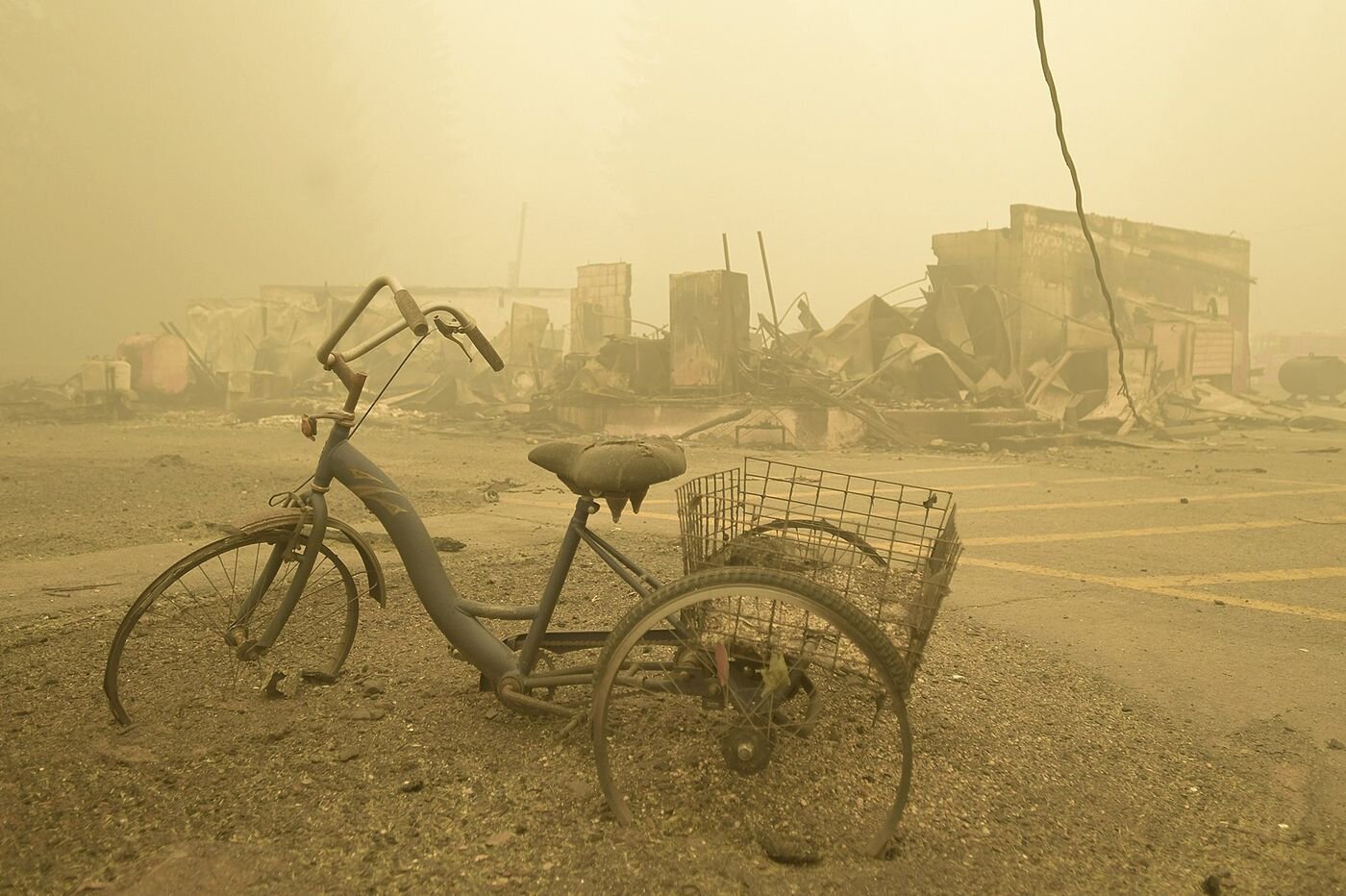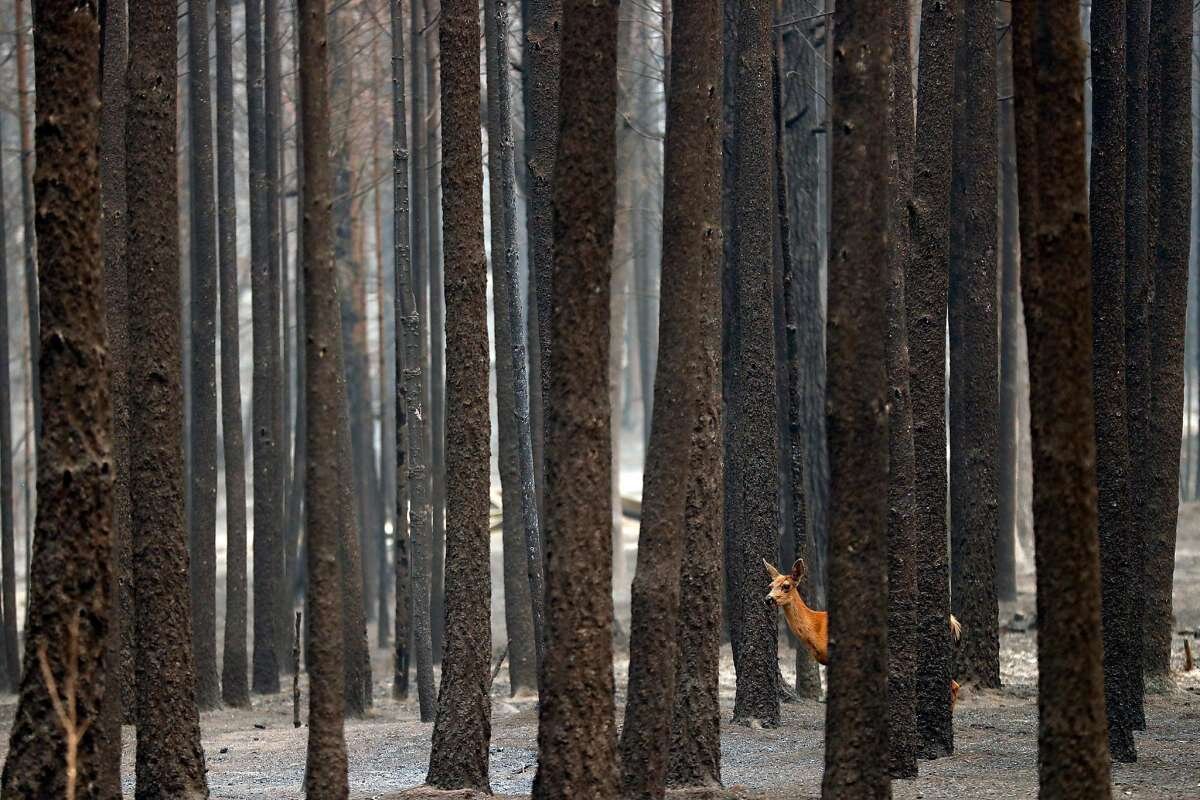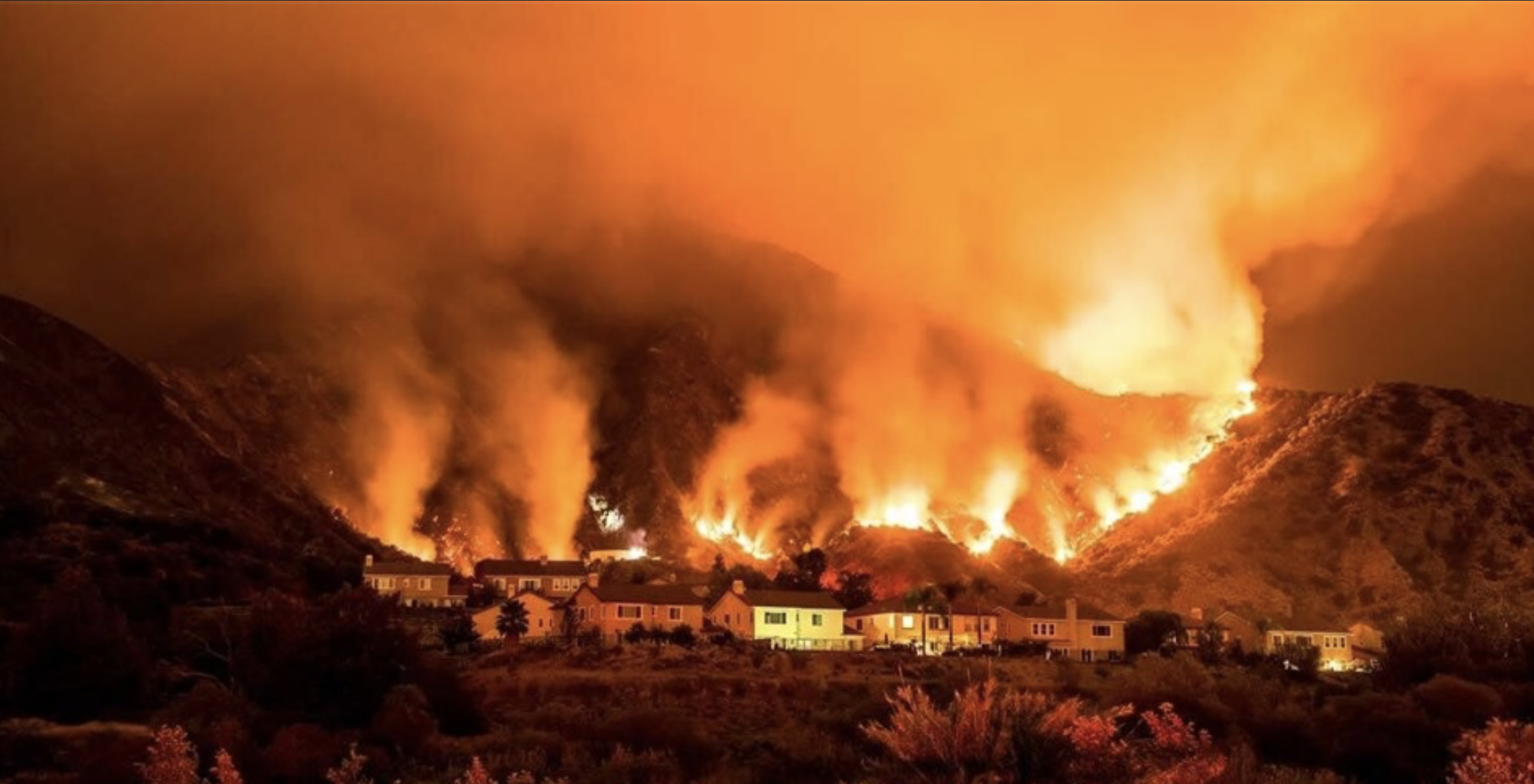Weekly Ingest Newsletter: Fourteenth Edition
Each week I curate a newsletter for all my listeners that are comprised of articles that are of interest to the topics I talk about the podcast. This newsletter also brings national and international news about sustainability and climate change they may often get overlooked, forgotten about, or is unheard of to the community I serve.
California’s Wildfires and Climate Change
A burned residence smolders during the Bear fire, part of the North Lightning Complex fires, in unincorporated Butte County, California on September 09, 2020. Dangerous dry winds whipped up California's record-breaking wildfires and ignited new blazes Tuesday, as hundreds were evacuated by helicopter and tens of thousands were plunged into darkness by power outages across the western United States. Josh Edelson/AFP/Getty Images
Our Lost World: On Wildfires and Climate Grief
From Rolling Stone: Jeff Goodwell
I’m writing this on Monday morning, before President Trump lands in California today to exploit the tragedy of the wildfires and scold Californians for not “cleaning the floors” of the forests or whatever mental toilet water he ends up spilling in the Golden State. You can be sure there will be no sympathy for the 33 lives that have been lost in wildfires on the West Coast, no human feeling for the vast suffering and devastation that the climate crisis has wrought on the west. Nor will there be any awareness of his own role in accelerating a crisis that will cause so much devastation for decades to come. “As an historic figure, he is one of the most culpable men in America contributing to the suffering and death that is now occurring through climate-related tragedy,” Jerry Brown, the former California governor who made climate change his signature issue, said in an interview on Sunday.
As a fourth-generation Californian, just imagining Trump in California makes me growl like one of the grizzly bears that used to inhabit my home state. I love California. I lived there until I was 25 and still don’t know why I left. My grandfather palled around with John Steinbeck. I’ve surfed in Shark’s Cove, dove in the kelp forests of Monterey, climbed Yosemite’s Half Dome a dozen times, spent many holidays at my mother’s house in the far north of the state, near the Oregon border. I grew up in Silicon Valley and watched the apricot orchards be replaced by high-tech office buildings. I wandered around the hills of Palo Alto with Steve Jobs and had a long dinner with Elon Musk when he was just a crazy rich dude pitching me his idea for an electric-car company named after an eccentric turn-of-the-century inventor named Nikola Tesla.
Mark Ylen / Albany Democrat-Herald/AP
The West Coast is burning, but Pa. can help
From The Philadelphia Inquirer: Will Bunch
Don’t cry about the wildfires. Demand that Pa. finally takes climate change seriously
It used to be the conventional wisdom that Americans couldn’t grasp the threat of climate change because the issue was too abstract. Well, what about now, when amid the shocking burnt-orange pictures of Pacific Coast skylines you read about the 13-year-old boy who died in Oregon’s wildfires while clutching his dog, while his frantic father told a burned, barefoot and barely recognizable woman that he couldn’t stop for her because he was searching for his wife, prompting the woman to whisper, “I am your wife”?
The heartbreaking story of that boy, Wyatt Tofte — whose grandmother also perished as the Beachie Creek fire enveloped Marion County, Oregon — hammered home the humanity of the West Coast wildfires that have claimed at least 36 lives. These annual events keep getting worse every year, in tandem with a warming planet. Indeed, it’s wrong to ever again call climate change a “threat.” It’s here, and it’s killing our fellow Americans — a situation that today can feel helpless in my home state of Pennsylvania, nearly 3,000 miles away.
To read more of Will’s work, you can sign up for his newsletter at inquirer.com/bunch.
A deer walks through a charred forest in Berry Creek (Butte County). More than 3 million acres have been burned by wildfires in California this season.Photo: Scott Strazzante / The Chronicle
Is climate change worsening California fires, or is it poor forest management? Both, experts say
From The San Francisco Chronical: J.D. Morris
Long before climate change severely parched California, priming it to burn at a record scale, federal foresters made an inventory of trees in the southern Sierra Nevada.
The year was 1911, and the goal of the fledgling U.S. Forest Service was to document the amount of timber in the area. More than a century later, however, the historical data set proved invaluable to researchers with a far different purpose: assessing how much the forest, and the inherent threat of fires within it, had evolved.
Meridith Kohut / ProPublica
Climate Change Will Force a New American Migration
From ProPublica: Abrahm Lustgarten
Wildfires rage in the West. Hurricanes batter the East. Droughts and floods wreak damage throughout the nation. Life has become increasingly untenable in the hardest-hit areas, but if the people there move, where will everyone go?
August besieged California with a heat unseen in generations. A surge in air conditioning broke the state’s electrical grid, leaving a population already ravaged by the coronavirus to work remotely by the dim light of their cellphones. By midmonth, the state had recorded possibly the hottest temperature ever measured on earth — 130 degrees in Death Valley — and an otherworldly storm of lightning had cracked open the sky. From Santa Cruz to Lake Tahoe, thousands of bolts of electricity exploded down onto withered grasslands and forests, some of them already hollowed out by climate-driven infestations of beetles and kiln-dried by the worst five-year drought on record. Soon, California was on fire.
Over the next two weeks, 900 blazes incinerated six times as much land as all the state’s 2019 wildfires combined, forcing 100,000 people from their homes. Three of the largest fires in history burned simultaneously in a ring around the San Francisco Bay Area. Another fire burned just 12 miles from my home in Marin County. I watched as towering plumes of smoke billowed from distant hills in all directions and air tankers crisscrossed the skies. Like many Californians, I spent those weeks worrying about what might happen next, wondering how long it would be before an inferno of 60-foot flames swept up the steep, grassy hillside on its way toward my own house, rehearsing in my mind what my family would do to escape.
*This article, the second in a series on global migration caused by climate change, is a result of a partnership between ProPublica and The New York Times Magazine, with support from the Pulitzer Center.*
Environmental Justice and Regulations
Tim Tai / The Philadelphia Inquirer
N.J. Gov. Murphy signs environmental justice law designed to protect minority communities
From The Philadelphia Inquirer: Frank Kummer
New Jersey Gov. Phil Murphy on Friday signed environmental justice legislation that allows the state to deny permits for projects that would have an environmental impact on already “overburdened” communities, defined as those predominated by minority or low-income people.
The law, which supporters say is one of the toughest in the nation, would apply to proposals for new or expanded power plants, recycling facilities, incinerators, sludge operations, sewage treatment plants, landfills, or any other major source of potential pollution.
The state Department of Environmental Protection would review such projects for “the cumulative impacts” on public health or environmental risk, based on “combined past, present, and reasonably foreseeable” future pollution.
The number of flood days in Charleston, South Carolina has risen from around four to around 89 in the last 50 years. Diane Cook and Len Jenshel / The Image Bank / Getty Images Plus
Charleston, SC Becomes First City in U.S. South to Sue Big Oil for Climate Costs
From EcoWatch: Olivia Rosane
The city of Charleston, South Carolina made history Wednesday when it became the first in the U.S. South to sue the fossil fuel industry for damages caused by the climate crisis.
The city sued 24 oil and pipeline companies, including major players like ExxonMobil, Chevron, BP and Royal Dutch Shell, The Post and Courier reported. The lawsuit contends that the companies knew that their products were heating the global climate but denied the fact in public. It further seeks to charge them for the costs of protecting Charleston from increased flooding and extreme weather events.
"As this lawsuit shows, these companies have known for more than 50 years that their products were going to cause the worst flooding the world has seen since Noah built the Ark," Charleston Mayor John Tecklenburg said during a press conference announcing the suit, as Live 5 News reported. "And instead of warning us, they covered up the truth and turned our flooding problems into their profits. That was wrong, and this lawsuit is all about holding them accountable for that multi-decade campaign of deception."
Source: The New York Times
What Trump’s Environmental Rollbacks Mean for Global Warming
From The New York Times: Nadja Popovich and Brad Plumer
President Trump has made dismantling federal climate policies a centerpiece of his administration. A new analysis from the Rhodium Group finds those rollbacks add up to a lot more planet-warming emissions.
The Trump administration has acted to repeal or weaken at least 100 environmental regulations over the past four years, including a number of Obama-era climate policies that Mr. Trump has said stifle businesses. The rollbacks include:
Fuel-economy standards: The Trump administration changed Obama-era rules that would have required new passenger cars, SUVs and pickup trucks sold in the United States to become less polluting over time. Instead of improving fleetwide fuel economy by 5 percent annually for model years 2021 through 2026, automakers will now have to improve just 1.5 percent per year.
The administration also revoked California’s authority to set its own tailpipe emissions standards and to mandate electric vehicles.California’s special right to set stricter automobile pollution limits than the federal government’s dates back to the Clean Air Act of 1970, and for years the state has required that automakers sell a certain amount of electric vehicles. As of September, 13 states and Washington, D.C., have formally adopted California’s policies and are challenging the administration’s decision in court.
A desalination plant proposed by Poseidon Water would be located on 12 acres at the AES Huntington Beach power plant, shown here. (Photo by Leonard Ortiz, Orange County Register/SCNG)
‘Environmental justice’ starts by providing more water
From The Orange County Register: Steven Greenhut
Environmentalists have won the latest battle in California’s water wars, as California American Water just announced it is temporarily withdrawing its application to build a desalination plant on an old sand mine in the largely low-income town of Marina near Monterey. The proposal faced a tough approval process at the California Coastal Commission after local activists complained about its effects on their community.
In a recent article, the Los Angeles Times asked this loaded question in its headline: “Is California serious about environmental justice? This water fight is a test.” The issue is simple, according to a former coastal commissioner interviewed by the Times reporter: “Who’s got the garbage? Who’s got the landfill? Who’s got all of it? Marina. … If the commissioners can’t see that now, their environmental justice policy is meaningless.”
Local communities have every right to be concerned about the siting of industrial facilities, but the worst way to promote “environmental justice” is to halt a facility that could provide much-needed water to a region that has, as even the article noted, “limited water options.” Cal Am proposed the desalination plant a decade ago to mitigate other, pressing environmental concerns — and still keep the water flowing to its thirsty customers.
A front-end loader moves garbage at the waste transfer station on Church Street. / Evanston Now
City plans ‘environmental justice’ database
From Evanston Now: Bill Smith
Evanston aldermen this week adopted a resolution that calls for city staff to develop a geographic information system database identifying what the resolution calls “environmental justice areas.”
Those are described as regions “in which there are likely to be disparities in access to environmental assets or exposure to hazards.”
The resolution suggests the database would be used to “help identify existing burdens, needed infrastructure improvements and investments that can be considered” by the city.
The resolution claims that “generations of Black Evanstonians, along with Latinx and other communities of color in the City of Evanston have disproportionately experienced environmental injustice in the past.”








